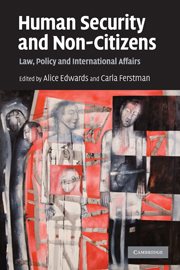Book contents
- Frontmatter
- Contents
- About the editors
- About the contributors
- Preface
- Acknowledgements
- Part I Human security, human rights and human dignity
- Part II Physical and legal security, armed conflict and refuge
- Part III Migration, development and environment
- 7 Empowering migrants: human security, human rights and policy
- 8 Labour migration management and the rights of migrant workers
- 9 Socio-economic rights, human security and survival migrants: Whose rights? Whose security?
- 10 An insecure climate for human security? Climate-induced displacement and international law
- 11 Human security and trafficking of human beings: the myth and the reality
- Part IV National security and the ‘war on terror’
- Index
9 - Socio-economic rights, human security and survival migrants: Whose rights? Whose security?
Published online by Cambridge University Press: 17 February 2011
- Frontmatter
- Contents
- About the editors
- About the contributors
- Preface
- Acknowledgements
- Part I Human security, human rights and human dignity
- Part II Physical and legal security, armed conflict and refuge
- Part III Migration, development and environment
- 7 Empowering migrants: human security, human rights and policy
- 8 Labour migration management and the rights of migrant workers
- 9 Socio-economic rights, human security and survival migrants: Whose rights? Whose security?
- 10 An insecure climate for human security? Climate-induced displacement and international law
- 11 Human security and trafficking of human beings: the myth and the reality
- Part IV National security and the ‘war on terror’
- Index
Summary
Introduction
Although migration is ‘the oldest action against poverty’, the debate on international migration has escalated since the end of the Cold War. The dismantling of old barriers that prevented many nationals from leaving certain countries coincided with a parallel construction of barriers that restricted entry by non-citizens into the territory of other states. The end of the Cold War also marked a departure from an era where the phenomenon of forced migration was dominated by the exilic discourse that characterised refugee protection. Once the euphoria of the new era dissipated, states came to realise that migration remained a powerful and ‘ineradicable’ impulse that would expose the underbelly of globalisation and highlight extant social and economic inequality. Survival migration, that is migration as a survival strategy, would become a metaphor for the tainting of ‘unprecedented human progress’ with an undercurrent of ‘unspeakable human misery’, a metaphor for the globalisation of prosperity and poverty.
Human rights are a set of minimum standards that reflect the inherent dignity, equality, and inalienable rights of all members of the human family, regardless of status. They are regarded as the foundation of freedom and justice and essential for maintaining peace and security. In a similar spirit, ‘human security’ is considered to be essential for the ‘lives, livelihoods and dignity of individuals and realizing the abundant potential inherent in each individual’. Each concept is explicitly people-centred, and each emerged or re-emerged in the post-Cold War era decisively.
- Type
- Chapter
- Information
- Human Security and Non-CitizensLaw, Policy and International Affairs, pp. 314 - 356Publisher: Cambridge University PressPrint publication year: 2010
- 7
- Cited by



